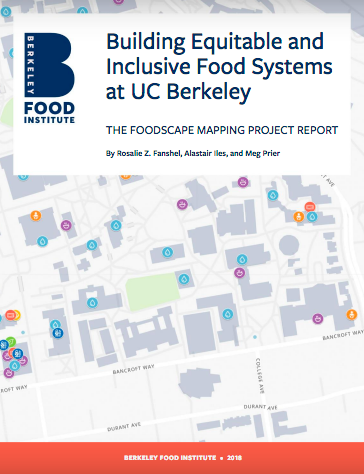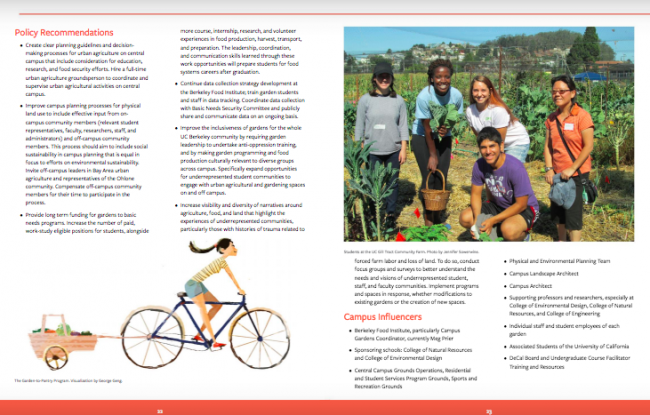Although interest in food justice has grown significantly at UC Berkeley in recent years, many community members still encounter major obstacles to equitable and inclusive participation in the campus food system. A 2016 report by the UC Global Food Initiative found, for example, that 39 percent of undergraduates and 23 percent of graduate students experience food insecurity at UC Berkeley. Further, many staff, particularly food service and custodial staff, as well as lecturers and postdoctoral fellows, also struggle to meet their basic food security needs.
The Berkeley Food Institute is seeking to tackle challenges like these through its “Building Equitable and Inclusive Food Systems” project, which has already brought more than 150 collaborators together from across campus to close gaps between the campus food system and the communities it serves.
As part of this effort, the project developed the UC Berkeley Foodscape Map, which provides extensive data on the structural factors affecting the campus food system. Among other things, the map reveals barriers facing marginalized community members in participating in food-related learning and practice, and highlights opportunities to overcome such obstacles.
With the support of a Haas Institute Intervention Grant, the project was expanded in spring 2018 to include the development of a vision for the campus food system and a set of policy recommendations, which served as companion pieces to the map. The resulting 40-page report offers data-driven suggestions to transform the UC Berkeley food system into one where all members of the community can enjoy equitable food experiences—whether in teaching, researching, working, learning, growing, or eating.
Project researchers found that UC Berkeley is a complex and dynamic food system, responsible for meeting the varied needs of over 41,000 students, 1,500 full time faculty, 8,800 staff, 750 lecturers, 1,400 postdoctoral fellows, and countless others who frequent campus regularly. It is the site of a 150-year legacy of extensive food and agricultural teaching and research. It has many gardens that produce food and provide education; almost 50 campus eateries with hundreds of hard-working food service workers that serve the campus population; vibrant student-led groups gathering around food topics; and multiple service programs to address food and health inequities for vulnerable members of the campus community.
39 percent of undergraduates and 23 percent of graduate students experience food insecurity at UC Berkeley
There are many exciting developments across campus: a growing student demand for interdisciplinary, practical, and experiential education in food systems topics, and the recent development of the Foods System Minor and Graduate Certificate in Food Systems to respond to this demand; an increase in the number of food production gardens; and the tremendous progress of the Basic Needs Security Committee.
Still, there remain significant inequalities and injustices across the university: a sizable number of undergraduate and graduate students, lower paid staff, and lecturers suffering from food insecurity that hampers their academic and work performance; disabled students being excluded from agricultural and research courses and opportunities; food-specific student groups not being as welcoming of underrepresented students as they could; fraternities and sororities with vastly different food options for male- and female-identified students, as well as other race and class-based disparities; and unstable funding for crucial food and health-related service programs.
Among other policy recommendations, researchers recommended forming a UC Berkeley Food Policy Council that directly advises the Chancellor and her cabinet on campus food systems issues. Council members should reflect the broad diversity of campus food systems players.
Another major finding was that in order to encourage marginalized campus members to feel more included, campus food policy must contend candidly with the lesser known history of racial, colonial, and gender exploitation behind many of the buildings, sites, and pedagogical legacy on campus. The campus must also acknowledge the traditional owners of the land on which UC Berkeley now exists: the Ohlone people, who have lost their land access and foodways.
Many students, staff, and faculty choose to come to UC Berkeley because of its reputation for being a university where equity, inclusion, and justice are upheld and can be expressed and advocated openly. We have a responsibility to uphold our Principles of Community. Food is a central part of our collective experience—it is essential to our well-being and can bring us closer together during a fractured and tempestuous national and international climate. By getting our kitchen in order, we can help build a successful campus food system that inspires universities and colleges across the country.
Rosalie Z. Fanshel is a Program Manager at the Berkeley Food Institute and Alastair Iles is an Associate Professor of Environmental Science, Policy, and Management at UC Berkeley.



